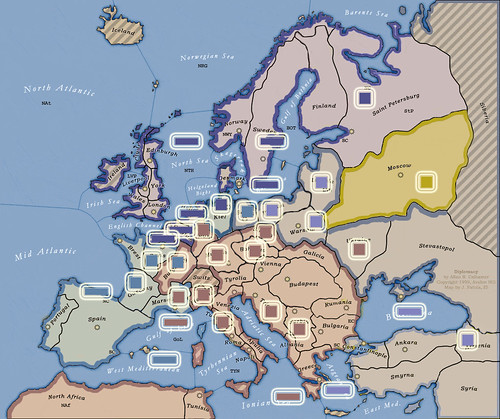The Quest for Responsible Neoconservatism

I’d like to endorse my American Scene colleague Noah Millman’s incisive comments on diplomacy and benign American power:
our unipolar moment makes diplomacy look rather different than historical models. And for that reason, non-coercive “win-win” bargains may be genuinely elusive, howsoever disposed the next President may be to seek them.
As Noah goes on to explain, some of our best diplomatic victories (and those of others) were only made possible by a geopolitical context of multipolarity and great-power conflict. Now, even after the travails of the past several years, the US is still far and away the world’s lone superpower, militarily, politically, economically, and culturally. Under such conditions, opportunities for diplomacy shrink.
In fact, a hypothesis I’ve toyed around with for a while would posit that world peace or world hegemony is asymptotically impossible — that is, the closer you approach it, the more difficult it gets; so it’s no surprise, on this model, that the US wound up after the seemingly spectacular success of the ’90s with the most hardened cases of unsolved foreign policy problems: North Korea, Iraq, Iran. And it’s also no surprise that these ‘toughest nuts’ were least amenable to diplomatic solutions.
The issue then is what’s a superpower to do, and here I return to a theme I wish I’d hear more about from others: neoconservatism doesn’t (or shouldn’t) mean acting out all one’s neoconservative fantasies, or doing whatever it takes to attempt to bring the ideal neoconservative world about. Someone who holds neoconservative principles does not, at least in my estimation, have to swear off any allegiance to prudence in practice. Put another way, aspiring to neocon ends does not (or should not) dictate adherence to some creed of neocon means. Of course, all policy programs have a hard core of procedural commitments; if you rule out regime change under any circumstance — or rule out the coercive enforcement of SSR 1441, as France stupidly and ruinously did — you are likely to shut down policy ends by shutting down means. But there is much more wiggle room here than is usually credited. When it is acknowledged, as in the case of Darfur, it usually comes in the form of heckling the prudent idealist as an opportunist, a hypocrite, or a fraud.
It seems to me that when neocons are attacked, they are usually attacked along one of the two lines I’ve just identified: either their ideological commitments are labeled horrifyingly deep or horrifyingly shallow. Without getting into an argument about which particular neoconservatives have made it easier than others for their enemies to put them in either category, I’d like to argue that it must be possible for neoconservatives to occupy a healthy middle position in which prudence still exercises control over the passions and interests. Any takers? You’ll find them, I bet, among those who still defend invading Iraq in principle yet now strongly oppose war with Iran.
(Photo courtesy of Flickr user Mike Haddad)
